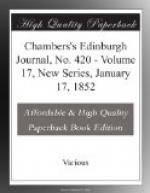Having finally arrived, friendless and moneyless, in New York, then in the occupation of the British, he endeavoured first to obtain a commission in the New York volunteers, and afterwards employment as mate in the Naval Hospital. In his endeavours, he was kindly assisted by a Jamaica gentleman, a fellow-passenger, whose regard during the voyage he had succeeded in conciliating by his amiable manners and evident abilities; but his efforts were all in vain, and poor Jackson, familiar with poverty from childhood, began now to experience the misery of destitution. In truth, starvation stared him in the face, and a sense of delicacy withheld him from seeking from his Jamaica friend the most trifling pecuniary assistance. In this, his state of desperation, he determined upon passing the British lines, and endeavouring to obtain amongst the insurgents the food he had hitherto sought in vain; resolving, however, under no circumstances to bear arms against his native country. Whilst moodily and slowly walking towards the British outposts to carry into execution this scheme, having in one pocket a shirt, and in another a Greek Testament and a Homer, he was met half-way by a British officer, who fixed his eyes steadily on him in passing. Jackson in his agitation thought he read in the glance a knowledge of his purpose and a disapprobation of it. Struck by the incident, he turned back, and, after a moment’s reflection, resolved on offering himself as a volunteer in the first battalion of the 71st regiment (Sutherland Highlanders), then in cantonment near New York. Arriving at the place, he presented himself to the notice of Lieutenant-Colonel (afterwards Sir Archibald) Campbell, who, having first ascertained that he was a Scotsman, inquired to whom he was known




